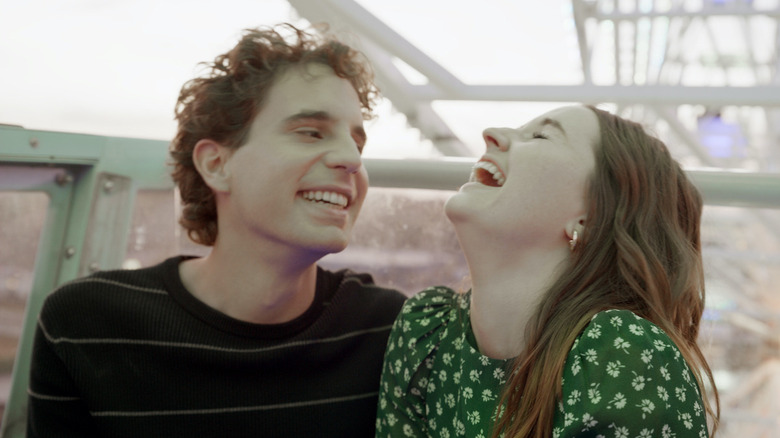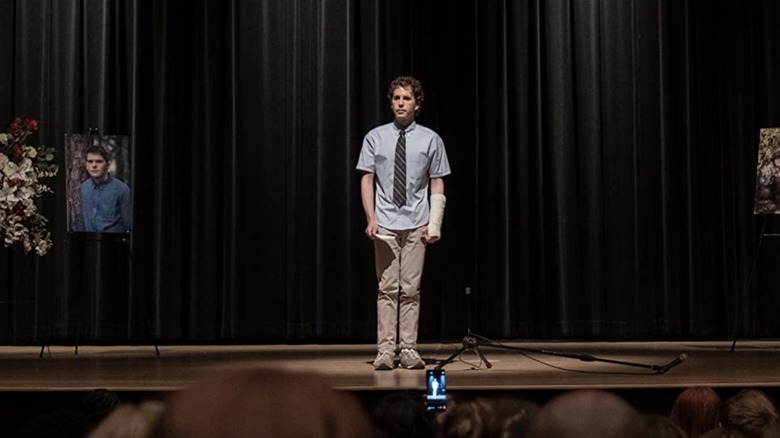Dear Evan Hansen Star Ben Platt On Donning The Blue Polo Again 6 Years Later [Interview]
When "Dear Evan Hansen" opened on Broadway in 2016, it was met with near-universal acclaim. The key word being "near," as the Tony-winning musical from Steven Levenson, and Benj Pasek and Justin Paul was also met with equally strong criticism about its handling of difficult issues like mental illness and suicide, and — most notably — with its depiction of its lead character, Evan Hansen.
A teen suffering from severe social anxiety and a vaguely referenced mental illness, Evan Hansen is the accidental con man whose white lies about his non-existent friendship with a high school classmate who committed suicide end up winning him internet fame and the love of said classmate's grieving sister.
It's a premise that ended up escaping many people outside of the theater community, but immediately raises eyebrows whenever people actually learn that "Dear Evan Hansen" is not actually about a gay teen romance.
So how does a musical with such a questionable premise win those near-universal accolades, including six Tony Awards? By a virtuoso performance by original star Ben Platt, one that would launch him to Broadway fame and rightfully win him a Tony Award. "Near" universal as the praise was for the show, it was unanimous that Platt was straight-up incredible.
But that was five years ago, when Platt was a cherubic 23 years old, playing a 17-year-old kid. On the stage, from the far-off seats of the theater, that suspension of disbelief might have been easier. But with a 27-year-old Platt reprising his role for the feature film version directed by Stephen Chbosky, that disbelief hits the ground with a thud — with many a critic calling attention to the miscasting in the mixed reviews coming out of the Toronto Film Festival.
To his credit, Platt isn't the only twenty-something in cinematic history to play a teen — it's a far-too common practice that was at its most uncanny in the beloved 1978 musical "Grease" (when the high schoolers are balding, you know something's wrong) and is still frequently done today in shows like "Riverdale," "Gossip Girl," and "Never Have I Ever."
"This has been happening for a long time in lots of different films," Platt told me in an interview for /Film ahead of the release of "Dear Evan Hansen." "So it's not reinventing the wheel."
But, fans of the show might argue, it is undercutting the impact of "Dear Evan Hansen," which relies on the audience sympathizing with its lead character because he's just a kid, and an outsider, and he's got an amazing baritone. Could that sympathy still be engendered in the big-screen version, with Platt back in the role?
I spoke with Platt about reprising the role of Evan Hansen six years later, what he brought to it from his own life experience, and the controversies surrounding the musical and his return.
"I was certainly quite nervous to re-enter that space."
So you take on the role six years after you originated onstage. Was it easy or difficult stepping back into the cast and the blue polo of Evan Hansen?
Definitely challenging, mostly in the really fun, juicy ways. But definitely a little bit scary. I had a wonderful experience doing the show for many years on the stage and developing the piece, and it was a very formative experience for me in many ways, professionally and personally. And to say goodbye to that and sort of move forward from that was a very difficult and just a heavy transition that I was fortunate to be able to do while making original music ... and putting out my first album and getting back in touch with myself separate from the character of Evan. So when it came back again and the film was becoming a reality, I was certainly quite nervous to re-enter that space, both in terms of myself as Ben professionally and also just mentally and emotionally to get back into Evan's mind and Evan's body because he has a lot of mental health challenges that he deals with and a lot of discomfort and difficulty connecting and a lot of self-hatred and things that aren't that fun to live in all the time.
But all of that was kind of overridden by just the excitement at the idea of how many young people would be able to see the story if it was a film and how many people of all ages hopefully could be affected by it emotionally and could feel seen by it and hopefully changed in the right way by it. And so that assuaged all of my personal fears about returning for sure. And I'm so very happy that we ended up doing it and then I was able to be part of it.
And in the interim you've had many more life experiences since you last took on the role. So did that change at all how you approached the role of Evan Hansen or was it about trying to get back into the head space when you first portrayed him?
I think it was definitely a combination. I think there were certain things and instincts and natural second-nature physicalities or emotions that were still there just from growing it for so long and for doing it for such a long time. And I certainly wanted to lean into those, but I think at the same time, as you said, I did grow a bit since then and I have kind of evolved a little as a person. And I think in order to protect myself in terms of my own mental health and my emotional health, I think this time I was able to maintain a bit more separation between the character. And I really appreciate him as a separate entity, a separate person that I have love for, and empathy for, and sympathy for, rather than being so synonymous with myself so that I could at the end of each day, after living in that head space and in that character, really come back to myself and to my own clothes and my own feelings and my own relationships. So I did appreciate feeling a bit closer to adulthood this time.
The musical takes on difficult fraught topics of mental illness and suicide. In returning to the role, especially for one when you'd be on screen generally in closeup, were you motivated to do more research into the depictions of anxiety disorders and mental illness, especially on the big screen?
Yes and no. I think it's kind of impossible not to experience all different iterations of mental health and mental health struggle just by virtue of the people in your life and your family and your friends and media and all of the ways in which we see depicted. I have my own mental health struggles with anxiety that I deal with. And so I think for me, it was just about making Evan as specific and as particular a person as possible. Obviously I had quite a lot of time to get to develop who that was and shape who that was. And then obviously adapt that for film. I think sometimes when we're speaking about such a global issue, such an important issue like mental health and you're trying to express such a broad idea, you can lose some of that idiosyncrasy or some of that specificity because you still want to be able to express something that can be universal and connected to by everyone.
And I think I've learned particularly from my years with Evan Hansen, that specificity and that idiosyncrasy really begets the universality. It really makes it connectable by everyone. I think the more particular and specific a character is, the easier it is to see yourself in him and to connect with him. So for me, I really tried to really just focus on this specific story and these specific issues just because there's such a huge spectrum of the ways in which mental health manifests itself. So for me, it was just staying focused on really just Evan specifically.
I know you lost weight and grew out your hair to return to the role. Can you explain your reasoning for doing both of those things?
Totally. I think I just wanted to feel for myself as close to Evan as I could and as I've envisioned him always in my mind, and as I mentioned before, for my own mental health and emotional health, I really wanted to feel a separation between Evan and I. As you can see, I like to express myself in a different way. When I'm myself, my hair, my beard, my clothes, that's who I am. And so the idea of allowing myself to transform somewhat physically to feel that separation and to feel like someone outside myself was important to me. And I always saw him as someone that, due to his anxiety and worry, I don't think he has the biggest appetite.
I don't think he's someone that can manage to eat a huge amount because of his nerves and because of his isolation. And in terms of the hair, I really wanted to feel a little bit shrouded and a little covered by the curls. And then in terms of the shaving and the youth, just trying to do what I can to return to that high school phase. But mostly it was just for my own performance, for my own emotional inner life to feel as much like him as I could.
"I'm really excited for the movie to speak for itself."
So we had to get to this question. What do you say to the criticisms that you're too old to reprise the part of a high schooler that you took on six years ago, and even then weren't high school-aged either?
Right. I would just say I'm really excited for the movie to speak for itself. I think people are hopefully going to see in the film why it was the way it was. I'm very grateful that the studio and the director asked me to be part of it. And I would just say that this has been happening for a long time in lots of different films. So it's not reinventing the wheel.
Your father, Marc Platt, also produces this film. Of course, his involvement has raised issues that you've addressed before, but would you like to address them again at all?
Not really, I'll just say that the film will speak for itself and that this was a project that I was involved with for many, many years, having nothing to do with my father. So my being in the film is because of the character that I created.
And the project, in coming from the stage, has changed since its original stage iteration. Were there any elements or songs from the original stage production that were cut that you really wish made it into the film or that you missed?
Not really. I love the musical. I love all of the songs from the original piece, but I think in terms of translating the story to the screen, I think all of the decisions were the right ones in terms of what songs made sense in a film world and made sense for the story and the way that we needed to tell the story on screen and which ones didn't quite work or work superfluous or needed to be replaced or added to. I really think that it was handled with a lot of care and a lot of attention and careful decision-making was by the whole creative team and the director and everybody. And so while of course I love a few of the songs from the show that aren't in the movie, I think it really makes sense that the numbers that stayed and the numbers that went, and I think that the two new numbers as well are really fantastic.
I noticed with the feature film version that there's more of an emphasis, I think, on grappling with mental illness and the effects that it has. Do you think that, that focus on those issues in particular came about after the original musical faced some criticism about its depiction of mental illness as well?
Sure. I think like anything, any project, I feel like you learn as you go and you develop over time and we evolve over time and we have new reference points and new conversations are opened up. And I think when you're adapting something that already exists, it's a great opportunity to improve upon it and see what can be deepened and what textures you can bring out. And I think the two most exciting and most important were the ways in which Evan's mental health specifically is discussed and also the character of Alana's [played by Amandla Stenberg] mental health and the ways in which Evan and Alana get to connect about the specificities of their struggles with mental health.
And then additionally, the kind of redemption and the repentance that Evan does for the mistakes that he makes in the film are given new life in the film that they didn't quite have the time to have in the musical. So I think that all of the right intentions and ideas and emotions were always there in the musical, but I think that they've been now almost more fully realized in the film.
"Dear Evan Hansen" hits theaters on September 24, 2021.


